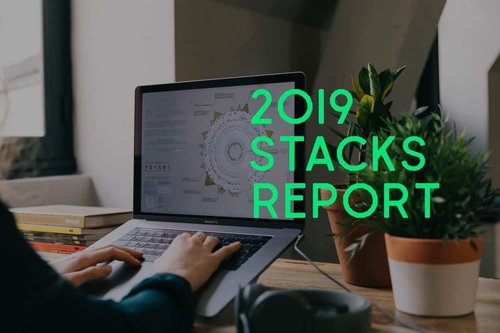The Key to Successfully Transitioning to Being a Freelance Developer
23. 7. 2019
5 min.


Digital marketing @ FreelanceRepublik
In 2018, nearly 11 million EU workers were freelance, according to a study by Malt. And even though being a developer actually does suit freelancing, going from a salaried job to independent status remains complicated and means you will probably make mistakes while switching statuses. If you’re considering becoming freelance, but hesitant about making the move, there’s no better way to learn than by asking those who have already been down the road that’s stretching ahead of you. We asked some freelance developers how they managed the move.
Go for a progressive transition
Becoming a freelancer can happen quickly… or not. It depends on your financial situation and appetite for risk. The main question to ask yourself is this: Can you afford to go without a wage for several months?
Jonathan Fidi, a senior front-end developer, took the chance after a disappointing professional experience while in a long-term contract at the start of his career. He decided to go freelance because being an employee wasn’t the right fit for him anymore. But although the transition was right for him, it didn’t come without its stresses: “I managed to get work, but payments took quite a while to reach my bank account. It made me very anxious because I had to keep paying my bills and rent.”
Many people therefore believe it’s a lot less stressful if you proceed progressively, in order to get the complete picture of your new work status, as it’s not just about coding, but also knowing how to deal with legal, accounting, commercial, and administrative issues.
Clément Camin is a web developer who decided to start freelancing in parallel with his full-time contract. “Besides being an employee at a start-up, I occasionally did some freelance developing and training work,” he explains. “It allowed me to test my ability to discuss projects, meet with clients, negotiate and intervene on new jobs, which was very different from what I was used to doing.”
However, taking on extra work to be done late at night and at weekends isn’t the only solution. You could also negotiate taking on part-time work at your company to really give yourself time to get into freelancing. You could also take a few months off as a sabbatical to see if it suits you before fully committing to your new status.
Multiply platforms to find your first clients
It’s not always easy to find your first bits of freelance work! The first thing to do is call on your network, both professional and personal. “It was my family and friends who helped me get my first jobs,” says Fidi.
Subscribing to a platform that specializes in freelancing like Toptal, or FreelanceRepublik in France, is a good idea as it is a quick and direct way of getting in touch with companies looking for developers. Etienne Folio, who currently works as a developer at Freelance Academy, also advises contacting IT companies. And don’t dismiss mainstream job offers if you were hoping for a short-term contract instead. You’d be surprised how open-minded companies can be when it comes to negotiating a bit further down the line.
You also need to make yourself visible online, so that you can attract as many potential clients as possible and give them confidence in your skills and experience. A personal blog is the best way to do that, as not only will it showcase your technical expertise, it will also demonstrate how confident you are about sharing your knowledge. In addition, it will reveal your ability to communicate and organize your ideas, which will be very appealing to your future clients.
Regularly attending conferences and meetups to hook up with other developers and extend your network is a very good idea, too, and last but not least, keep in mind that contributing to an open-source project is one of the best ways to show your skill set and increase your list of contacts.
Be demanding from the beginning
It can be difficult to estimate your value on the market, but you should be demanding concerning your daily rate, as well as the kind of jobs you accept, from the outset.
So, after checking what the market prices are, as well as your competitors’ rates (via freelancing platforms or after contacting developer friends directly), decide on your rate—and stick to it! Many developers agree to lower it in the early days of going freelance when a customer makes the request, but while it’s true that doing that will probably mean they get the job, the value of their work will be diminished.
You should also be selective from the very beginning when it comes to the jobs you agree to take on. Young freelance developers often make the mistake of taking on every one that comes their way out of fear of nothing else turning up. “At first, I wasn’t very selective, because I didn’t really know what to expect and I was afraid of not having any clients,” says Camin. “But now, it’s the opposite! I choose who I work with, the projects, and even the technologies.” At the start, define the criteria that are important to you, write them down, and respect this list as much as you can. This will help you not to become bogged down by uninteresting projects that will, at best, waste your time and money, and at worst, leave your reputation compromised due to hastily finishing projects to ensure you meet your deadlines.
You’re also going to want to remain demanding about following the engagement process properly. Don’t start working until the quote and precise specifications of the job have been properly agreed on and signed off. Going ahead with only a verbal agreement in place is a common mistake that will just lead to frustrations throughout the project that could affect prices, timelines, billing methods, and the project’s scope.
You should also keep in mind that the more motivated about a job you are, the more smoothly it will run, and thus the better your chances of your clients being satisfied. And a happy client will be able to testify you do a good job and recommend you to other companies, which will help you continue to find other jobs.
Allow yourself some rest
One of the most common mistakes freelance developers make is not making sure they set aside enough spare time for themselves. That’s what Camin experienced, so he changed his approach. “You don’t make money while on holiday when you’re freelancing, so it can quickly become scary not to work,” he says. “My way of overcoming this was choosing to work to live, rather than the other way round. Today, I only work 4 days a week.”
It’s inevitably tempting to work more in order to earn more, but beware of burning out—and the isolation this can bring with it. The solution is to decide on the maximum you will work and stick to this, too! You should also include holiday time in your schedule and factor the lack of revenue into your day rate.
Many developers think about going freelance, but often they hold back from taking the plunge, put off by the potential obstacles and a certain lack of reliable information. Don’t forget that you have the right to seek help, and that you don’t have to handle everything on your own! For instance, don’t hesitate to approach an accountant or an agency. After all, ticking all these boxes means you’ll be able to devote more time to your real passion: Coding!
This article is part of Behind the Code, the media for developers, by developers. Discover more articles and videos by visiting Behind the Code!
Want to contribute? Get published!
Follow us on Twitter to stay tuned!
Illustration by Brice Marchal

Další inspirace: Career hacking
Because being a developer is not just about coding, we want to share dedicated tips on soft skills and career paths, help you stay up-to-date with your favorite technologies, and learn more about the job market.

Computing’s Gender Divide: Why Tech Is Stuck in the 1980s
Discover why the percentage of women who held computing-based jobs has been in a steady decline since the 1980s.
14. 9. 2020

5 Remote-work Lessons From the Open-source Community
The open-source movement has a few things it can share about remote working with the wider software-development community.
09. 6. 2020

2019 Stacks Report
The most-mentioned technologies in the job specifications published on WTTJ's website in 2019 and the average number of applicants per technology.
21. 4. 2020

Engineering Management: An Interview with Saad Rehmani
Saad Rehmani, the VP of Engineering at Reddit, shares his most effective management strategies to handle the COVID-19 crisis.
07. 4. 2020

Engineering Management: An Interview with Rich Archbold
Rich Archbold, the VP of Engineering at Intercom, explains how to develop a management style and how to transition to managing other managers.
17. 3. 2020
Zpravodaj, který stojí za to
Chcete držet krok s nejnovějšími články? Dvakrát týdně můžete do své poštovní schránky dostávat zajímavé příběhy, nabídky na práce a další tipy.

Hledáte svou další pracovní příležitost?
Více než 200 000 kandidátů našlo práci s Welcome to the Jungle
Prozkoumat pracovní místa